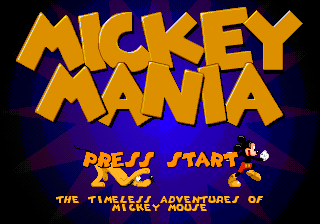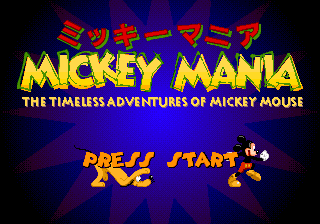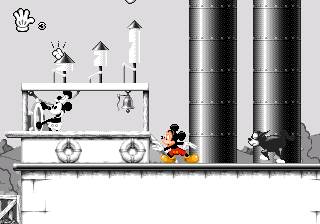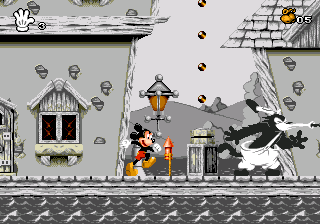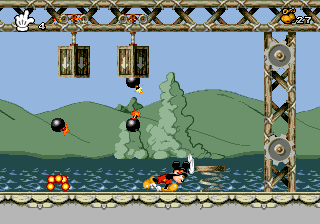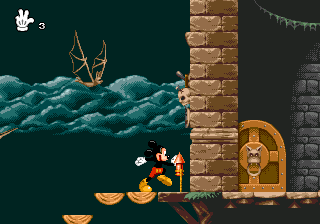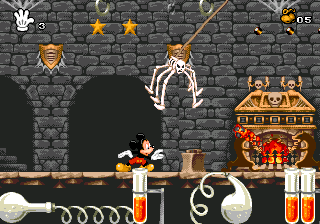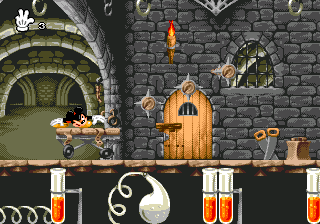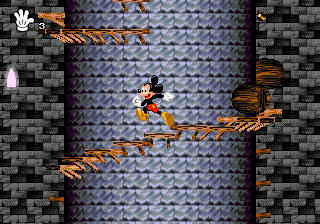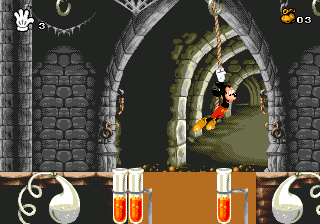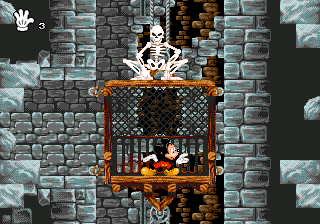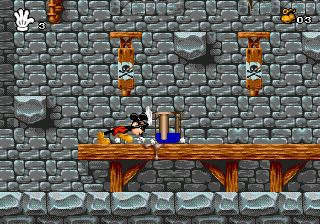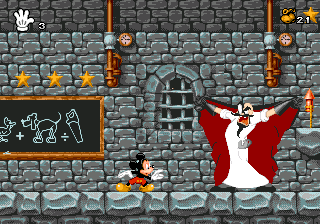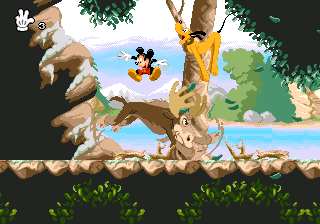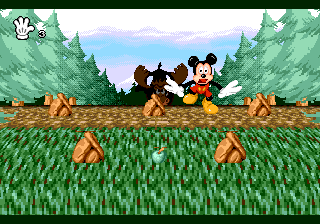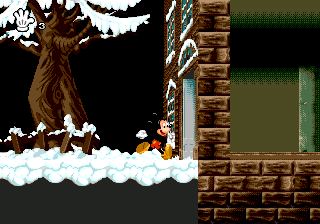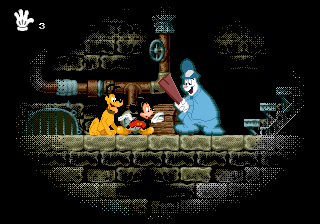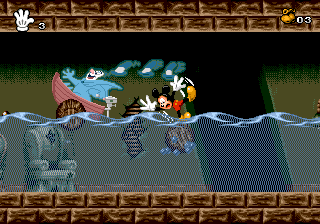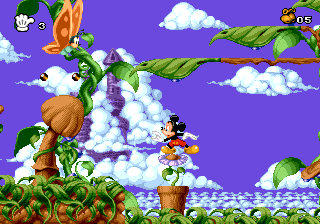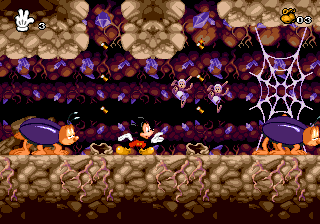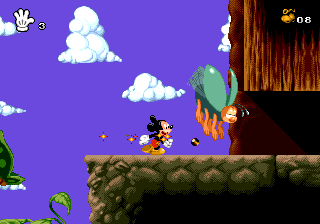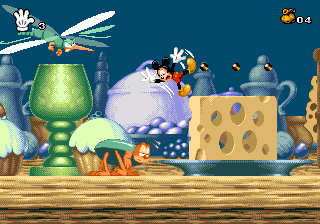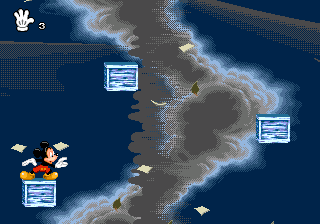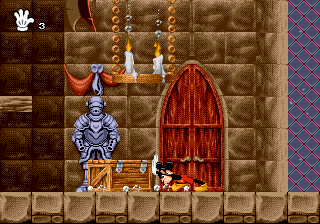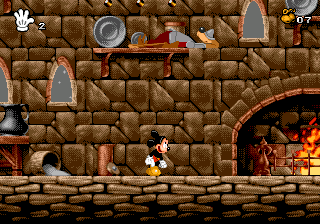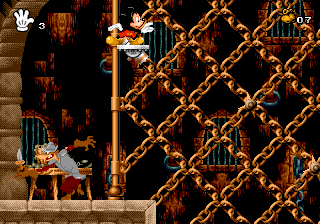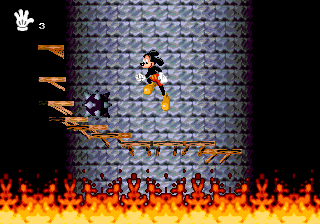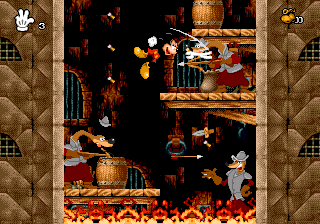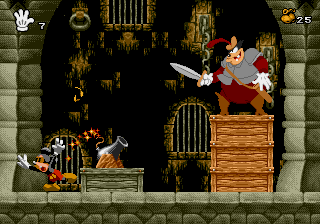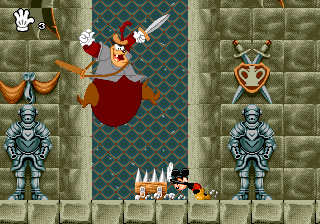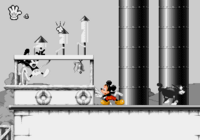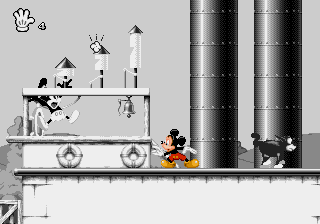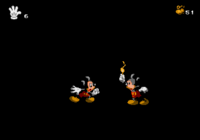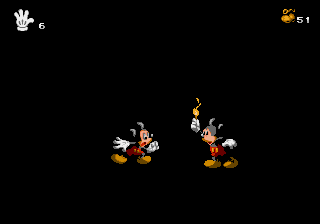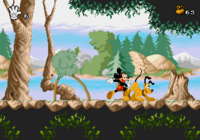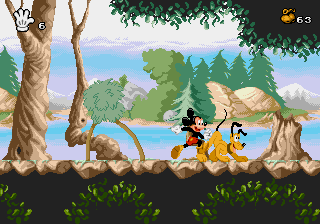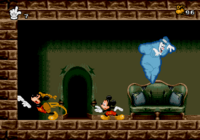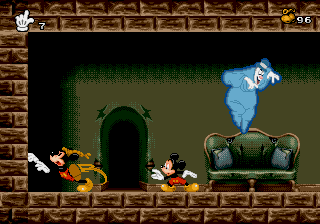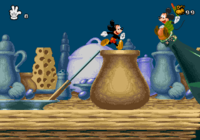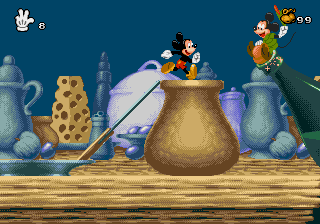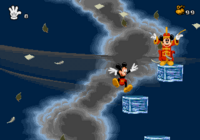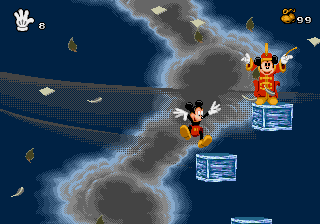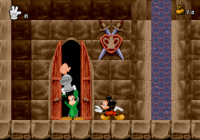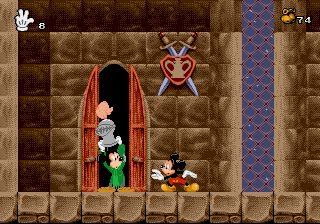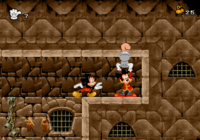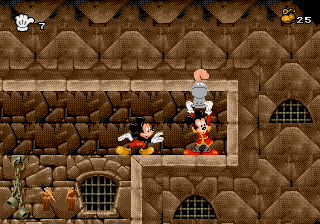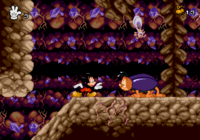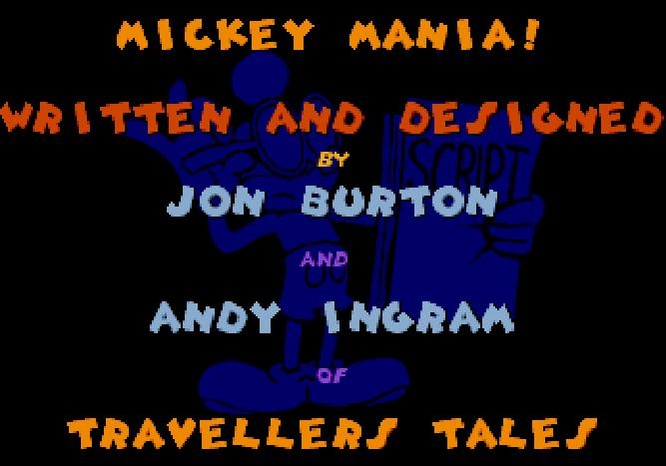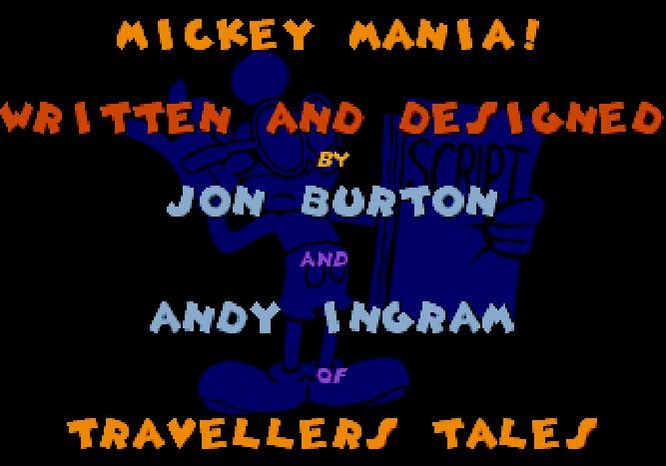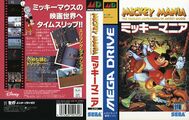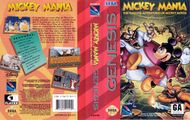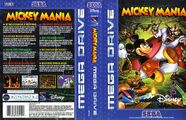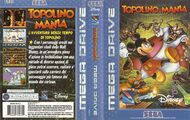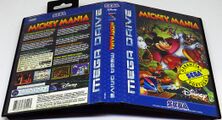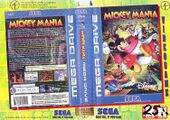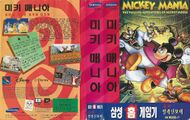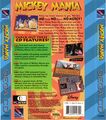Mickey Mania: The Timeless Adventures of Mickey Mouse
From Sega Retro
| |||||||||||||||||||||||||||||||||||||||||||||||||||||||||||||||||||||||||||
| Mickey Mania: The Timeless Adventures of Mickey Mouse | |||||||||||||||||||||||||||||||||||||||||||||||||||||||||||||||||||||||||||
|---|---|---|---|---|---|---|---|---|---|---|---|---|---|---|---|---|---|---|---|---|---|---|---|---|---|---|---|---|---|---|---|---|---|---|---|---|---|---|---|---|---|---|---|---|---|---|---|---|---|---|---|---|---|---|---|---|---|---|---|---|---|---|---|---|---|---|---|---|---|---|---|---|---|---|---|
| System(s): Sega Mega Drive, Sega Mega-CD | |||||||||||||||||||||||||||||||||||||||||||||||||||||||||||||||||||||||||||
| Publisher: Sony Imagesoft (US, Europe) Sega (Japan) | |||||||||||||||||||||||||||||||||||||||||||||||||||||||||||||||||||||||||||
| Developer: Traveller's Tales, Psygnosis, Disney Software | |||||||||||||||||||||||||||||||||||||||||||||||||||||||||||||||||||||||||||
| Licensor: The Walt Disney Company | |||||||||||||||||||||||||||||||||||||||||||||||||||||||||||||||||||||||||||
| Sound driver: Krisalis sound driver | |||||||||||||||||||||||||||||||||||||||||||||||||||||||||||||||||||||||||||
| Genre: Action[1][2] | |||||||||||||||||||||||||||||||||||||||||||||||||||||||||||||||||||||||||||
| Number of players: 1 | |||||||||||||||||||||||||||||||||||||||||||||||||||||||||||||||||||||||||||
| Official in-game languages: | |||||||||||||||||||||||||||||||||||||||||||||||||||||||||||||||||||||||||||
| |||||||||||||||||||||||||||||||||||||||||||||||||||||||||||||||||||||||||||
| |||||||||||||||||||||||||||||||||||||||||||||||||||||||||||||||||||||||||||
Mickey Mania: The Timeless Adventures of Mickey Mouse (ミッキーマニア), with its PlayStation version known as Mickey's Wild Adventure in PAL regions, is a platform game starring Disney's mascot, Mickey Mouse. Developed by Traveller's Tales and published by Sony Imagesoft, the player controls Mickey as he travels through various levels themed on Mickey Mouse cartoons from 1928 to 1990.
The game was originally designed to be released as part of Mickey's 65th birthday, but as this only left six months to complete the game, the release date was pushed back.
Being a rather late release and having a considerable 16 Megabit ROM size, the game features detailed animation, varied background graphics and plenty of impressive programming tricks.
Contents
Gameplay
Mickey Mania is a side-scrolling platform game. Mickey is moved around with ![]() and
and ![]() and jumps with
and jumps with ![]() . He can crouch with
. He can crouch with ![]() . He can defeat enemies by jumping on top of them or by throwing marbles at them with
. He can defeat enemies by jumping on top of them or by throwing marbles at them with ![]() . Marbles are limited but can be found throughout the stages. Mickey can throw marbles while jumping but not while crouching. He can also push objects with
. Marbles are limited but can be found throughout the stages. Mickey can throw marbles while jumping but not while crouching. He can also push objects with ![]() or
or ![]() when adjacent to them, which is necessary to progress in many of the stages.
when adjacent to them, which is necessary to progress in many of the stages.
Mickey has five hit points (represented by a picture of his gloved hand). He loses a hit point each time he takes damage from an enemy or an environmental hazard (including fire and deep water), but he can replenish his health by finding Stars. Mickey retains his health and his marbles from stage to stage. Mickey loses a try if he loses all of his points, and restarts with half the marbles he had (or 10 if he had less than 10). If he loses all of his tries, the game ends, though it can be continued as long as the player has continues remaining.
Items
| Marble | |
|---|---|
| Augments Mickey's marble count. Marbles are thrown at enemies to defeat them. | |
| Star | |
| Restores one point of Mickey's health. | |
| Mickey Mouse Hat | |
| Gives the player an extra try. | |
| Rocket | |
| Checkpoint where Mickey is revived after losing a try. | |
| Pencil | |
| Summons a Mickey to help in the fight against Pete in the Mega-CD version of the game. |
Levels
| Steamboat Willie (1928) | |
|---|---|
| Steamboat Willie was the first Mickey Mouse cartoon to be distributed, and so is generally considered to be the starting point for the character. Mickey Mania is very liberal with this cartoon, featuring not just a ship but a wharf area which slowly turns from monochrome to colour as Mickey progresses through the stage. To proceed through the wharf, Mickey must ring bells to lower the bridge, and knock out Pete in order to use him as a trampoline.
A pair of boxes operated by cranes serve as the boss of the stage and attack by dropping bombs on Mickey, periodically moving off the screen to reload. Mickey must stop the cranes by destroying the gears by jumping on them or throwing marbles at them. The lower gears take five hits to destroy, while the upper gears are too high to jump on, but are destroyed with three marbles - to reach those, Mickey must bounce off the lower gears or the occasional spring dropped by the cranes. | |
| The Mad Doctor (1933) | |
| Mickey Mania's depiction of The Mad Doctor deviates the most from the original source material in that the entire stage is presented in colour, when the film was originally in monochrome. After crossing the bridge, the stage sees Mickey swing over fire and acid pits, ride gurneys while avoiding buzzsaws and spikes, descend down a Nebulus-style tower, ride an elevator and mix chemicals in order to destroy a door.
Much like the cartoon itself, there is an encounter with the Mad Doctor (or Dr. XXX) and a captured Pluto is rescued (the major difference being that in the cartoon, Mickey is also captured before waking up to find the whole thing was a dream). | |
| Moose Hunters (1937) | |
| Moose Hunters deviates considerably from the original cartoon, in that Mickey's cohorts, Goofy and Donald, are nowhere to be seen. Instead, Pluto warns the player of incoming moose, culminating in a chase sequence. To escape from the chasing moose, Mickey must jump over rocks and water, and collect apples for stamina. If he goes too long without picking up an apple, he will gradually slow down and be run over. | |
| Lonesome Ghosts (1937) | |
| Lonesome Ghosts also lacks Goofy and Donald, who play equal roles to Mickey in the original short. The stage also deviates even further from the cartoon by having Mickey make his way through the basement, which is filled with staircases that turn into slides when climbed. The hallways see Mickey riding barrels across water that will hurt him if he sinks into it and pushing a table while avoiding attacks from the ghosts. | |
| Mickey and the Beanstalk (1947) | |
| Like with the previous two cartoons to be featured in the game, Donald and Goofy are absent. The stage sees Mickey travelling through the gardens and an underground tunnel filled with spiders, which sees him ride a ladybug to escape a giant spider. Afterwards, he must climb the steps to enter Willie the Giant's castle and cross a table filled with food.
Willie the Giant is also nowhere to be seen in most versions of the game, though the PlayStation version featured him in a chase sequence. | |
| The Band Concert (1935) | |
| In Mickey Mania, The Band Concert is a bonus stage found in the third area of Mickey and the Beanstalk, and grants the player an extra continue if completed. The Band Concert was the first Mickey short to be presented in colour, though curiously most of the "band" is missing in this game. | |
| The Prince and the Pauper (1990) | |
| The most recent cartoon to be represented in the game (with a 43-year gap between this cartoon and Mickey and the Beanstalk), and the longest in the game. Mickey must find Pauper Mickey in the library, then make his way into the dungeon to rescue the Prince, then make his way up Pete's tower.
The final boss is Captain Pete. To defeat him, Mickey must trick him into jumping on spikes five times, then flip a switch to hit him with a ball and chain six times. The Mega-CD version adds an extra part before the original fight where Mickey must collect pencils to summon the Mickeys he has met throughout the game to help him. |
Mickeys
In every stage of the game, Mickey meets a past version of himself from the source film of the stage. Most of them are encountered in the normal course of completing the stage, with the exception of Mad Doctor Mickey, who is found in a hidden room in the elevator segment of the stage. Band Concert Mickey is seen at the end of his stage, but his stage is hidden and must be found first.
History
Legacy
Many of the ideas seen in Mickey Mania, specifically that of platforming through levels based on old Mickey Mouse shorts, were brought forward in the 2010 Wii game, Epic Mickey and its 2012 sequel, Epic Mickey 2: The Power of Two.
Versions
The game was initially released on the Sega Mega Drive and Super Nintendo Entertainment System. New additions are an improved water effect in the Prince and the Pauper section and extra background layers in Mickey and the Beanstalk sections in the Nintendo's console. However, the Super NES version suffers from several cutbacks, such as the missing Nebulus-like staircase section of the second stage, missing Band Concert bonus level, and numerous special effects and Pluto cameos, as well as introducing loading times (among the longest loading times for a cartridge-based system).
Mickey Mania was later brought to the Sega Mega-CD with a CD audio soundtrack and a lot more voice tracks. Mickey now comments on enemies, sections and happenings in stages. The fight against Pete was expanded, with Mickey calling all previous incarnations for help. New "parachute" spider enemies were added to the underground segment of the Mickey and the Beanstalk level.
The Sega Mega-CD version was then ported to the PlayStation (as Mickey's Wild Adventure in Europe), with an improved color palette and other added graphical effects, the difficulty level was also increased (for example, the skeletons in the Mad Doctor stage release more bones) and a new chase section was added to the Mickey and the Beanstalk stage.
Production credits
Mega Drive version
- Written and Designed by: Jon Burton and Andy Ingram of Travellers Tales
- Executive Producer: Rich Robinson
- Senior Producer: Mary Ann Norris
- Associate Producer: David Poe
- Designed By: Mike Giam, David Jaffe
- Testing Team: Bruce Cochrane, Jose Cruz, Jody Kelsey, Andre Leighton, Seth Luisi Tobin Russell
- Programmed By: Jon Burton
- Graphics By: Andy Ingram
- Conceptual Artist: Bev Bush
- Graphic Artists: Dave "Scooter Boy" Burton, Bev "Vibrating Pen" Bush, James "Action Man" Cunliffe, Andy "What Fuel" Ingram, Linda "Red Shoes" Smith
- Additional Programming: Dave "Reality Cap" Dootson
- Office Organisation: Andy "A.B.S." Blundell
- Utility Programming: Jon "Kitcar" Burton, Dave "Dac Mortin" Dootson, Chris "The Cars Gone" Stanforth
- Big Bang Witnessed By: Paul "I Remember When..." Hunter
- Sorry Im Late But.....: Raoul Barrnett
- Moral Support: Helen "Im Fine" Musk
- Credit Text Typed and Checked By: Jon Burton
- Director, Sotware Production: Ron Fortier
- Senior Producer: Patrick Gilmore
- Assistant Producer: Craig Annis
- Production Associate: Arden Ishimura
- Mickey Digital Cleanup Model: Alex Schaefer
- Additional Music: Michael Giacchino
- Producer: Paul Curasi
- Assistant to the Producer: Annette Laguer
- Production Coordinator: Cammie Cavallin
- Animation Consultant: Chris Bradley
- Project Specialist: Pam Darley
- Producer: G. Sue Shakespeare
- Animation Director: David Molina
- Animation Director: Terry Shakespeare
- Animators: Rejean Bourdages, Ian Christopher Chiasson, Dave Kuhn, Mike Milo, David Molina, Natasha Sasic, Terry Shakespeare, Shane Zalvin
- Special Effects Assistant: Kathy Burton
- Final Checking: Carla Washburn
- Production Coordinator: Robert Rose
- Production Accountant: Patrice Monis
- U.K. Q.A. Management: Feargus Carroll
- U.K. Quality Assurance: Phil "Tails" Snape, Paul Tweedle, Paul Evason, Jenny Newby, Stuart Sockett, Paul Charsley, Lol Scraggs, M. Stacey, Chris Rowley, Leon Walters, Craig Puzzled, Tony "Sonic" Parks, Greg Double, Gary Nichols, Jamie Riding, B.Y. Puggsy
- Graphics Southwest Management: Simon Gardner
- Artists: Kevin Ayre, Theo Pantazia, Mark Scott
- Music: Blythe Joustra, Matt Furness
- Music Driver: Shaun Hollingworth
- Music Manager: Paul Morris
- Development Systems: Psy Q, Special Thanks to John Rostron
- External Evaluations: Sara Dixon
- Tour Management: Ian Grieve
- P.A.: Kiastie "Gude Morrrning" Beamish
- Project Management and Food Parcels: Steve "400 Grand" Riding
- Cover artist: Greg Wray
Mega-CD version
- Written and Designed by: Jon Burton and Andy Ingram of Travellers Tales
- Executive Producer: Rich Robinson
- Senior Producer: Mary Ann Norris
- Associate Producer: David Poe
- Designed By: Mike Giam, David Jaffe
- Testing Team: C J Connoy, Bruce Cochrane, Jose Cruz, Jody Kelset, Andre Leighton, Seth Luisi, Tobin, Russell, Kurt Schwengel
- Programmed By: Jon Burton
- Sega CD Adaption By: David Dootson
- Graphics By: Andy Ingram
- Conceptual Artist: Bev Bush
- Graphic Artists: Dave "Scooter Boy" Burton, Bev "Vibrating Pen" Bush, James "Action Man" Cunliffe, Andy "What Fuel" Ingram, Linda "Red Shoes" Smith
- Additional Programming: Dave "Reality Cap" Dootson
- Office Organisation: Andy "A.B.S." Blundell
- Utility Programming: Jon "Kitcar" Burton, Dave "Dac Mortin" Dootson, Chris "The Cars Gone" Stanforth
- Big Bang Witnessed By: Paul "I Remember When..." Hunter
- Sorry Im Late But.....: Raoul Barrnett
- Moral Support: Helen "Im Fine" Musk
- Credit Text Typed and Checked By: Jon Burton
- General Manager: Marc Teren
- Director, Sotware Production: Ron Fortier
- Senior Producer: Patrick Gilmore
- Assistant Producer: Craig Annis
- Production Associate: Arden Ishimura
- Mickey Digital Cleanup Model: Alex Schaefer
- Additional Music: Michael Giacchino
- Manager, Software Licensing: Sue Fuller
- Producer: Paul Curasi
- Assistant to the Producer: Annette Laguer
- Production Coordinator: Cammie Cavallin
- Animation Consultant: Chris Bradley
- Project Specialist: Pam Darley
- Producer: G. Sue Shakespeare
- Animation Director: David Molina
- Animation Director: Terry Shakespeare
- Animators: Rejean Bourdages, Ian Christopher Chiasson, Dave Kuhn, Mike Milo, David Molina, Natasha Sasic, Terry Shakespeare, Shane Zalvin
- Special Effects Assistant: Kathy Burton
- Final Checking: Carla Washburn
- Production Coordinator: Robert Rose
- Production Accountant: Patrice Monis
- U.K. Q.A. Management: Feargus Carroll
- U.K. Quality Assurance: Phil "Tails" Snape, Paul Tweedle, Paul Evason, Jenny Newby, Stuart Sockett, Paul Charsley, Lol Scraggs, M. Stacey, Chris Rowley, Leon Walters, Craig Puzzled, Tony "Sonic" Parks, Greg Double, Gary Nichols, Jamie Riding, Sara Riding, Katie Riding, Anna Riding, B.Y. Puggsy
- Graphics Southwest Management: Simon Gardner
- Artists: Kevin Ayre, Theo Pantazia, Mark Scott
- Music Management: Phil Morris
- Music: Blythe Joustra
- Sound FX: Tim "Grand Lad" Wright
- Development Systems: Psy Q, Special Thanks to John Rostron
- External Evaluations: Sara Dixon
- Tour Management: Ian Grieve
- P.A.: Kiastie "Gude Morrrning" Beamish
- Project Management and Food Parcels: Steve "800 Grand" Riding
- Cover artist: Greg Wray
Magazine articles
Promotional material
Artwork
Physical scans
Mega Drive version
| 83 | |
|---|---|
| Based on 40 reviews | |
| Mega Drive, AU |
|---|
|
Mega-CD version
| Sega Retro Average | |||||||||||||||||||||||||||||||||||||||||||||||||||||||||||||||||||||||||||||||||||||||||||||||||||||||||||||
|---|---|---|---|---|---|---|---|---|---|---|---|---|---|---|---|---|---|---|---|---|---|---|---|---|---|---|---|---|---|---|---|---|---|---|---|---|---|---|---|---|---|---|---|---|---|---|---|---|---|---|---|---|---|---|---|---|---|---|---|---|---|---|---|---|---|---|---|---|---|---|---|---|---|---|---|---|---|---|---|---|---|---|---|---|---|---|---|---|---|---|---|---|---|---|---|---|---|---|---|---|---|---|---|---|---|---|---|---|---|
|
| 84 | |
|---|---|
| Based on 21 reviews | |
| Mega-CD, PT |
|---|
|
Technical information
ROM dump status
| System | Hash | Size | Build Date | Source | Comments | |||||||||
|---|---|---|---|---|---|---|---|---|---|---|---|---|---|---|
| ✔ |
|
2MB | 1994-10 | Cartridge (US) | ||||||||||
| ✔ |
|
2MB | 1994-10 | Cartridge (EU) | ||||||||||
| ✔ |
|
2MB | 1995-01 | Cartridge (JP) | ||||||||||
| ? |
|
2MB | 1994-07 | Cartridge[71] | Page | |||||||||
| ✔ |
|
2MB | 1994-09 | Cartridge[72] | Page | |||||||||
| ? |
|
500,872,512 | CD-ROM (EU) | T-93305-50 | ||||||||||
| ✔ |
|
500,872,512 | CD-ROM (US) | T-93265 | ||||||||||
| ? |
|
1994-08-25 | CD-R | Page |
References
- ↑ File:MickeyMania MD JP Box.jpg
- ↑ 2.0 2.1 https://sega.jp/history/hard/megadrive/software.html (Wayback Machine: 2020-07-20 09:51)
- ↑ Game Players, "Vol. 7 No. 10 October 1994" (US; 1994-xx-xx), page 12
- ↑ 4.0 4.1 Game Players, "Vol. 7 No. 10 October 1994" (US; 1994-xx-xx), page 84
- ↑ Sega Magazine, "November 1994" (UK; 1994-10-15), page 90
- ↑ Computer & Video Games, "December 1994" (UK; 1994-11-15), page 65
- ↑ Mega, "November 1994" (UK; 1994-10-27), page 50
- ↑ Sega Megazone, "January 1995" (AU; 199x-xx-xx), page 25
- ↑ Sega Magazine, "August 1994" (UK; 1994-07-15), page 90
- ↑ File:Mickey Mania MD credits.pdf
- ↑ File:Mickey Mania MCD credits.pdf
- ↑ 1700 igr dlya Sega, "" (RU; 2001-xx-xx), page 128
- ↑ CD Consoles, "Novembre 1994" (FR; 1994-xx-xx), page 155
- ↑ Cool Gamer, "9" (RU; 2002-10-13), page 123
- ↑ Computer & Video Games, "November 1994" (UK; 1994-10-15), page 98
- ↑ Electronic Games (1992-1995), "November 1994" (US; 1994-1x-xx), page 122
- ↑ Entsiklopediya luchshikh igr Sega. Vypusk 1, "" (RU; 1999-xx-xx), page 332
- ↑ Entsiklopediya luchshikh igr Sega. Vypusk 4, "" (RU; 2001-xx-xx), page 160
- ↑ Famitsu, "1995-04-07" (JP; 1995-03-24), page 32
- ↑ Freak, "1/95" (IL; 1995-xx-xx), page 1
- ↑ Game Players, "Vol. 7 No. 12 December 1994" (US; 1994-1x-xx), page 52
- ↑ GamePro, "November 1994" (US; 1994-xx-xx), page 98
- ↑ Gamer, "Dekémvrios 1994" (GR; 1994-xx-xx), page 1
- ↑ Games World: The Magazine, "December 1994" (UK; 1994-10-28), page 14
- ↑ Game Informer, "November 1994" (US; 1994-1x-xx), page 20
- ↑ Hobby Consolas, "Diciembre 1994" (ES; 1994-xx-xx), page 86
- ↑ Joypad, "Novembre 1994" (FR; 1994-1x-xx), page 72
- ↑ Joypad, "1/1995" (HU; 1995-xx-xx), page 23
- ↑ LeveL, "Leden 1995" (CZ; 1995-01-24), page 40
- ↑ MAN!AC, "11/94" (DE; 1994-10-12), page 40
- ↑ Mega, "November 1994" (UK; 1994-10-27), page 10
- ↑ Mega Fun, "11/94" (DE; 1994-10-19), page 69
- ↑ 33.0 33.1 Micro Kid's Multimédia, "Décembre 1994" (FR; 1994-1x-xx), page 64
- ↑ Mean Machines Sega, "December 1994" (UK; 1994-10-28), page 76
- ↑ Next Generation, "Premiere Issue 1995" (US; 1994-12-08), page 107
- ↑ Player One, "Novembre 1994" (FR; 1994-1x-xx), page 86
- ↑ Play Time, "11/94" (DE; 1994-10-05), page 100
- ↑ Power Up!, "Saturday, October 29, 1994" (UK; 1994-10-29), page 1
- ↑ Saturn Fan, "1995 June" (JP; 1995-05-08), page 40
- ↑ Sega Power, "November 1994" (UK; 1994-09-29), page 42
- ↑ Sega Pro, "December 1994" (UK; 1994-11-03), page 48
- ↑ Svet Kompjutera, "Jun 1996" (YU; 1996-xx-xx), page 84
- ↑ Sega Saturn Magazine, "April 1995" (JP; 1995-03-08), page 130
- ↑ Sega Saturn Magazine, "September 1995" (JP; 1995-08-08), page 87
- ↑ Sonic the Comic, "January 6th 1995" (UK; 1994-12-24), page 12
- ↑ Todo Sega, "Enero 1995" (ES; 199x-xx-xx), page 30
- ↑ Tricks, "4/95" (RU; 1995-xx-xx), page 29
- ↑ Tricks 16 bit, "Tricks Sega Gold 800 igr" (RU; 1998-03-20), page 114
- ↑ Video Games, "12/94" (DE; 1994-11-23), page 40
- ↑ 50.0 50.1 VideoGames, "December 1994" (US; 1994-1x-xx), page 88
- ↑ https://aukro.cz/sega-mega-drive-2xovladac-5xhra-7022973231
- ↑ Computer & Video Games, "January 1995" (UK; 1994-12-15), page 107
- ↑ Electronic Games (1992-1995), "November 1994" (US; 1994-1x-xx), page 156
- ↑ Electronic Gaming Monthly, "November 1994" (US; 1994-xx-xx), page 46
- ↑ Freak, "1/95" (IL; 1995-xx-xx), page 1
- ↑ GameFan, "Volume 2, Issue 11: November 1994" (US; 1994-xx-xx), page 32
- ↑ Game Players, "Vol. 7 No. 11 November 1994" (US; 1994-1x-xx), page 153
- ↑ GamePro, "December 1994" (US; 1994-xx-xx), page 142
- ↑ Games World: The Magazine, "January 1995" (UK; 1994-11-xx), page 21
- ↑ Game Informer, "January 1995" (US; 199x-xx-xx), page 42
- ↑ Joypad, "Novembre 1994" (FR; 1994-1x-xx), page 76
- ↑ MAN!AC, "12/94" (DE; 1994-11-09), page 94
- ↑ Mega Fun, "12/94" (DE; 1994-11-23), page 96
- ↑ Magazina Igrushek, "2/1995" (RU; 1995-xx-xx), page 76
- ↑ Next Generation, "Premiere Issue 1995" (US; 1994-12-08), page 104
- ↑ Player One, "Novembre 1994" (FR; 1994-1x-xx), page 147
- ↑ Play Time, "12/94" (DE; 1994-11-09), page 108
- ↑ Sega Magazin, "Dezember 1994" (DE; 1994-11-17), page 83
- ↑ Sega Magazine, "December 1994" (UK; 1994-11-15), page 90
- ↑ Sega Pro, "January 1995" (UK; 1994-12-01), page 67
| Mickey Mania: The Timeless Adventures of Mickey Mouse | |
|---|---|
|
Main page | Comparisons | Maps | Hidden content | Magazine articles | Video coverage | Reception | Promotional material | Region coding | Technical information | Bootlegs
Demos: Mickey Mania: The Timeless Adventures of Mickey Mouse (1994)
Prototypes: 1994-08-25
| |
| Castle of Illusion Starring Mickey Mouse (1990) | QuackShot Starring Donald Duck (1991) | World of Illusion Starring Mickey Mouse and Donald Duck (1992) | Goofy's Hysterical History Tour (1993) | The Great Circus Mystery Starring Mickey & Minnie (1994) | Mickey's Ultimate Challenge (1994) | Mickey Mania (1994) | Donald in Maui Mallard (1995) | The Magical Quest Starring Mickey Mouse (unreleased) | Mickey Mania 2 (unreleased) | Mickey Mouse: Private Eye (unreleased) | |
| Castle of Illusion Starring Mickey Mouse (1990) | The Lucky Dime Caper Starring Donald Duck (1991) | Land of Illusion Starring Mickey Mouse (1992) | Deep Duck Trouble Starring Donald Duck (1993) | Legend of Illusion Starring Mickey Mouse (1997) | Mickey's Ultimate Challenge (1998) | |
| Castle of Illusion Starring Mickey Mouse (1991) | The Lucky Dime Caper Starring Donald Duck (1991) | Land of Illusion Starring Mickey Mouse (1993) | Deep Duck Trouble Starring Donald Duck (1993) | Mickey's Ultimate Challenge (1994) | Legend of Illusion Starring Mickey Mouse (1995) | |
| Mickey no Yukai na Bouken (1993) | Donald no Obake Taiji (1993) | Mickey's Blast into the Past (1994) | Donald no TV Show (1995) | Mickey to Ooki na Furudokei (1996) | Mickey no Tokyo Disneyland Stamp Rally (1996) | Tokyo Disneyland Toon Town Mickey no Boku wa Untenshu (1997) | Mickey to Utau Tori no Shima Minnie o Sagashite Waku Waku Daibouken! (1998) | Mickey no Boku wa Meitantei (2000) | Fishing Pico: Donald no Adventure Fishing (2000) | Tokyo DisneySea Mickey to Asobou! (2002) | |
| Sega Ages I Love Mickey Mouse: Fushigi no Oshiro Daibouken/I Love Donald Duck: Gurujia Ou no Hihou (1998) | Maui Mallard and the Lost City Of Dread (unreleased) | |
| Disney's Donald Duck Quack Attack (2000) | |
| Castle of Illusion Starring Mickey Mouse (2013) | |
- 1 player games
- JP Mega Drive games
- All JP games
- US Mega Drive games
- All US games
- EU Mega Drive games
- All EU games
- PT Mega Drive games
- All PT games
- UK Mega Drive games
- All UK games
- SE Mega Drive games
- All SE games
- IT Mega Drive games
- All IT games
- CZ Mega Drive games
- All CZ games
- AU Mega Drive games
- All AU games
- KR Mega Drive games
- All KR games
- Mega Drive games
- 1994 Mega Drive games
- All 1994 games
- Mega Drive action games
- All action games
- US Mega-CD games
- EU Mega-CD games
- DE Mega-CD games
- All DE games
- PT Mega-CD games
- Mega-CD games
- 1994 Mega-CD games
- Mega-CD action games
- Old content rating field
- All games
- Credits without reference
- Old-style rating (consolesplus)
- Update ratings template
- 0 old ratings
- Games with known prototypes
- Missing ROM hashes
- Old technical information
- Mickey Mania: The Timeless Adventures of Mickey Mouse
- Disney
